eBPF helpers are a vital part of any eBPF program. It is often not easy to figure out, which helper you have available for a certain program type at a given Linux Kernel Version. The goal of this blog post is, to document some ways of answering the question “Can I use bpf helper abc in a xyz program at Linux Kernel version n”.
docs.ebpf.io
One pretty amazing resource for anything eBPF related is docs.ebpf.io. It was started by Dylan Reimerink (as far as I can tell).
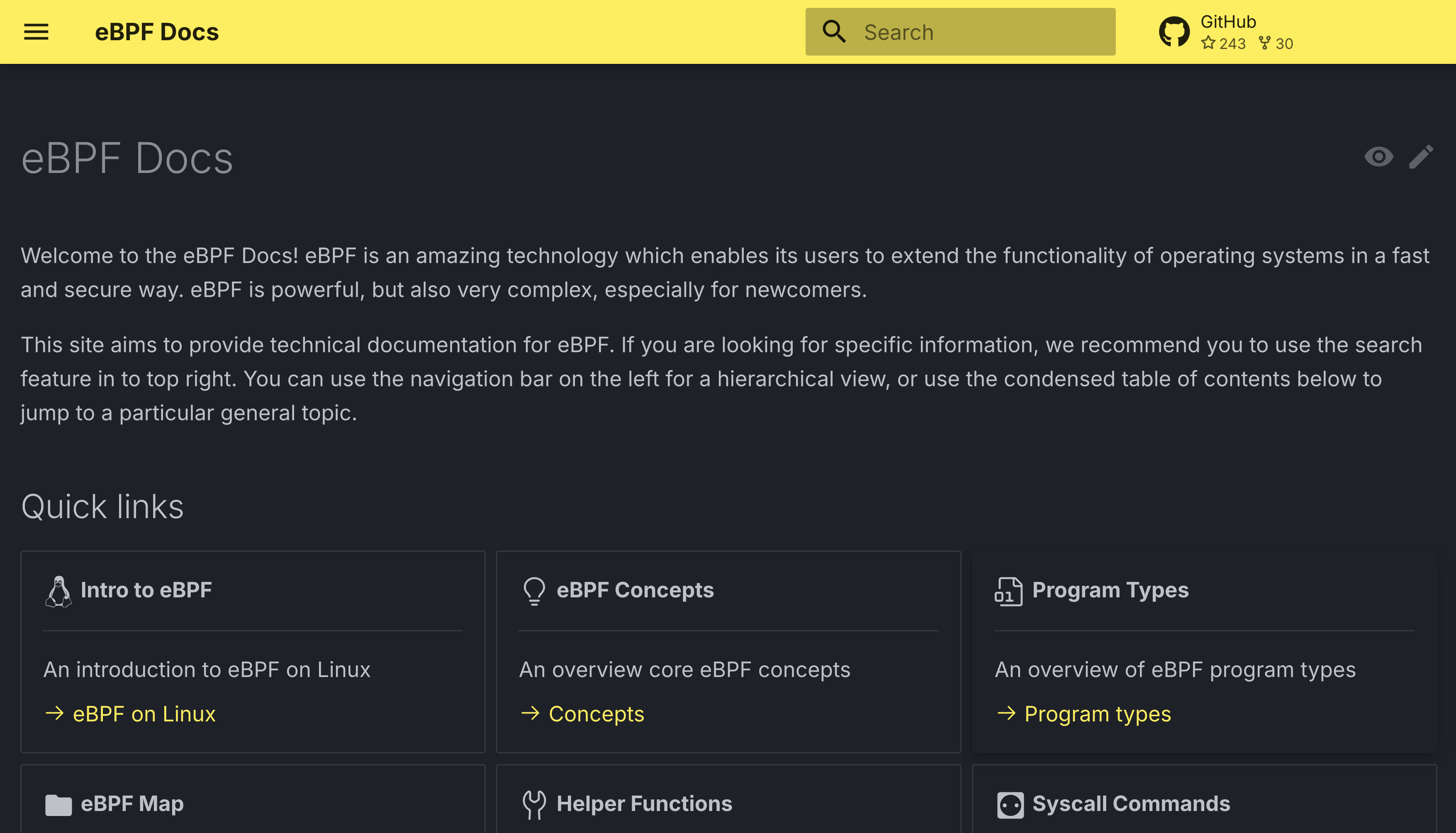
Not only does it contain documentation for most eBPF helpers, program types and
maps, but also includes a kernel version it was introduced in. Take for example
the bpf_sk_storage_get helper. The documentation for it can be found under
linux/helper-function/bpf_spin_lock/.
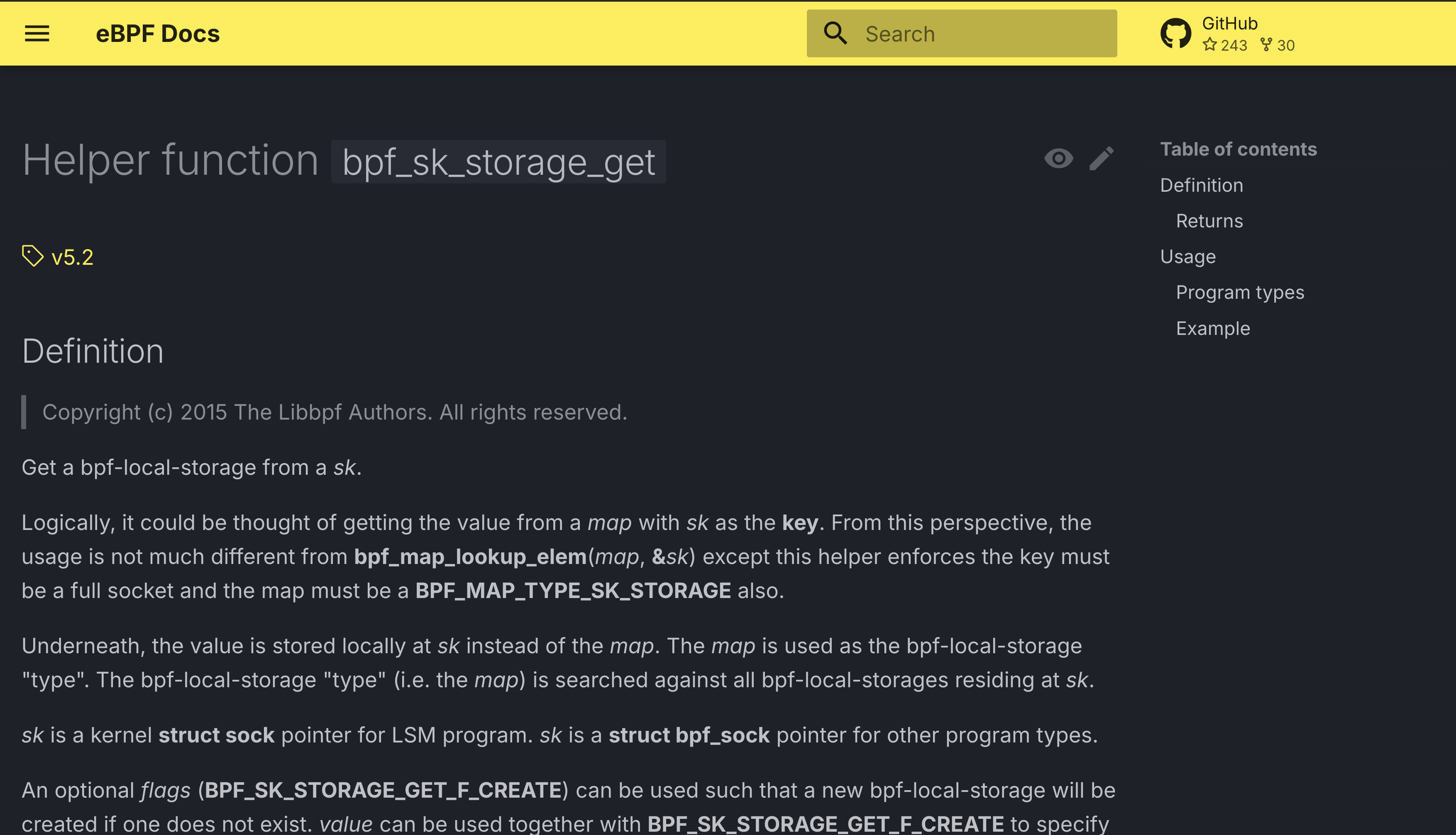
The first thing you see on the page is the version it was introduced, in this case it was
v5.2. There is also quick overview what the helper does, as well as how to use it. You will also
find a list of program types the helper is available in, which is exactly what we were searching
for.

One word of caution though. All the docs on the website are manually created, meaning that there can be mistakes, as well as just missing data. When a helper is only later than its introduction available to a certain program type, you will find a small label next to the program type with the starting version it was introduced.

In case you notice any missing data or error on the page, I would suggest you head over to the docs GitHub repo and open a PR with the fix. The maintainers there are friendly and contributions are welcomed.
bpftool
If you are writing eBPF programs, you probably heard about
bpftool before. In case you do not know it, bpftool is part
of the libbpf project and offers various utilities, such as listing all eBPF programs and maps
currently loaded, to dumping the content of specific maps and even dumping the BTF for a given
binary. It is a pretty powerful and incredibly useful tool to know how to use.
One feature that I only learned recently, is the bpftool feature probe kernel command. The output
of this subcommand is a list of all supported program types/map types and helpers by program type.
Now, if you want to figure out if e.g. syscall programs support the bpf_spin_lock helper on our
current kernel version, all we need to do is run bpftool feature probe kernel | less, search for
eBPF helpers supported for program type syscall and go through the list of helpers it lists. If
bpf_spin_lock is there, it means it is supported on the current kernel version, if not, it is not
supported.
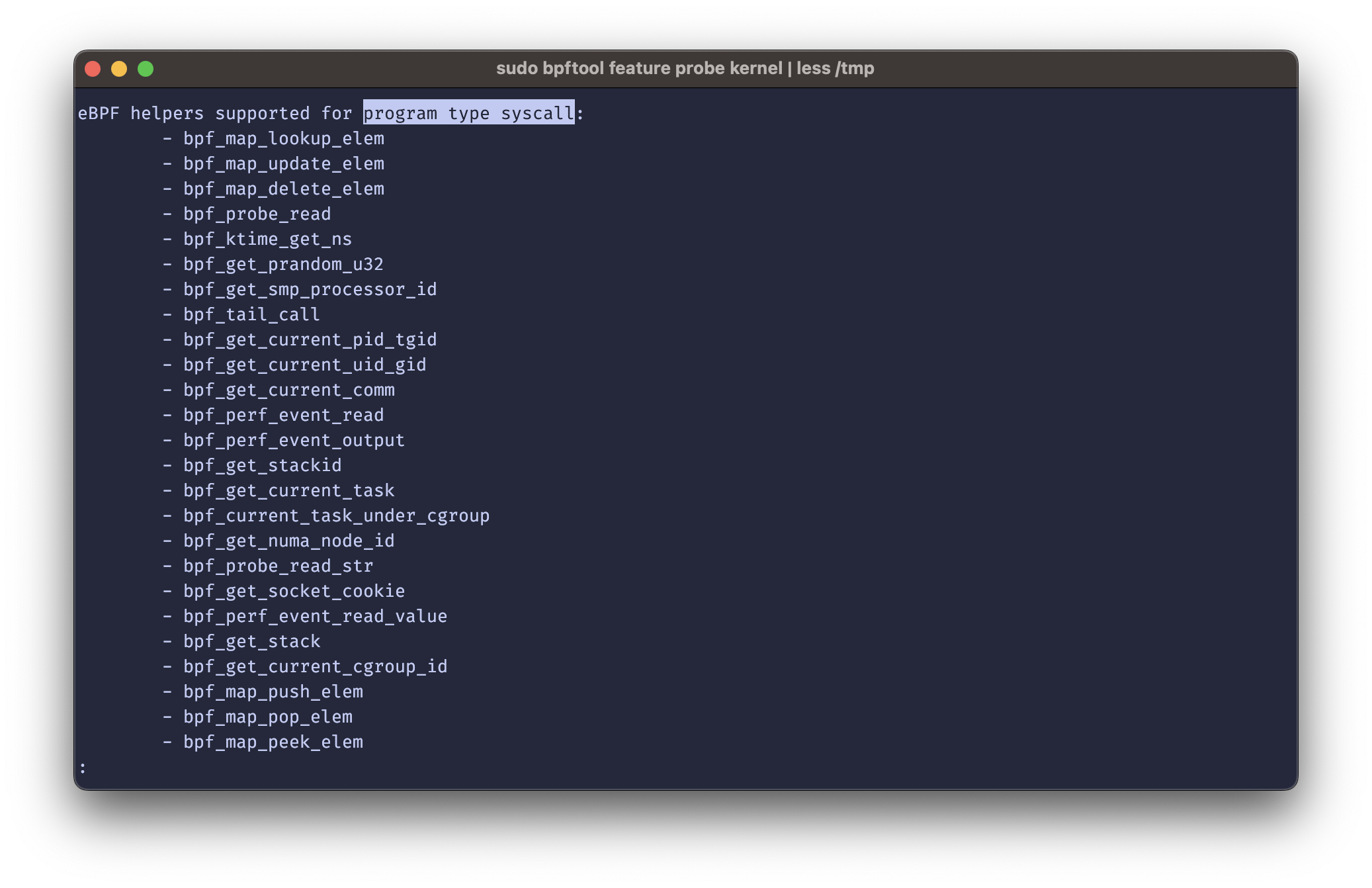
The bpftool method does have a few downsides though. One of the most obvious is, that it will
only show the available helpers/program types for the current kernel version. There is simply no
way of using it to figure out if a certain helper is present at a certain kernel version, without
first running the kernel locally. This is just the way bpftool works, as it will try to load a
small eBPF program with just a call to the helper.
Another problem I encountered with bpftool (and haven’t fully figured out yet) is, that is
sometimes fails to determine the helper support for certain program types. Here an example output
eBPF helpers supported for program type tracing:
Could not determine which helpers are available
Using Bootlin (aka exploring Linux Kernel Source Code)
As we have seen before, both bpftool and docs.ebpf.io have their downsides, when trying to figure
out what helpers you have available in eBPF program types at certain kernel versions. The ultimate
method, but also the one including the most work, is to simply have a look at the Linux Kernel
Source Code of whatever version you want to support.
Let’s try to figure out if we can use the bpf_spin_lock helper in an eBPF program of type
BPF_PROG_TYPE_TRACING on Linux Kernel version v5.10.
We first start by navigating to the include/linux/bpf_types.h file for our target kernel version on Bootlin. It contains definitions for all the program types supported in that version of the Linux Kernel.

The verifier also uses this file to map each program
type to some verifier options, based on some macro definitions we can find
here. To figure out if
a helper can be used in a certain program type, all we need to do is to find the corresponding
verifier ops and have a look at the get_func_proto function pointer. The verifier ops follow a
specific naming pattern. It will just take the second argument passed to BPF_PROG_TYPE and append
_verifier_ops (as seen in the verifier macro definition).

In our case, we want to figure out if bpf_spin_lock is
available for program type BPF_PROG_TYPE_TRACING. In
include/linux/bpf_types.h,
the second argument passed to the definition is tracing. This means the verifier ops we are
searching for is called tracing_verifier_ops. We can enter this in the search box on the upper
right with the placeholder text Search Identifier. There should be only a single result.
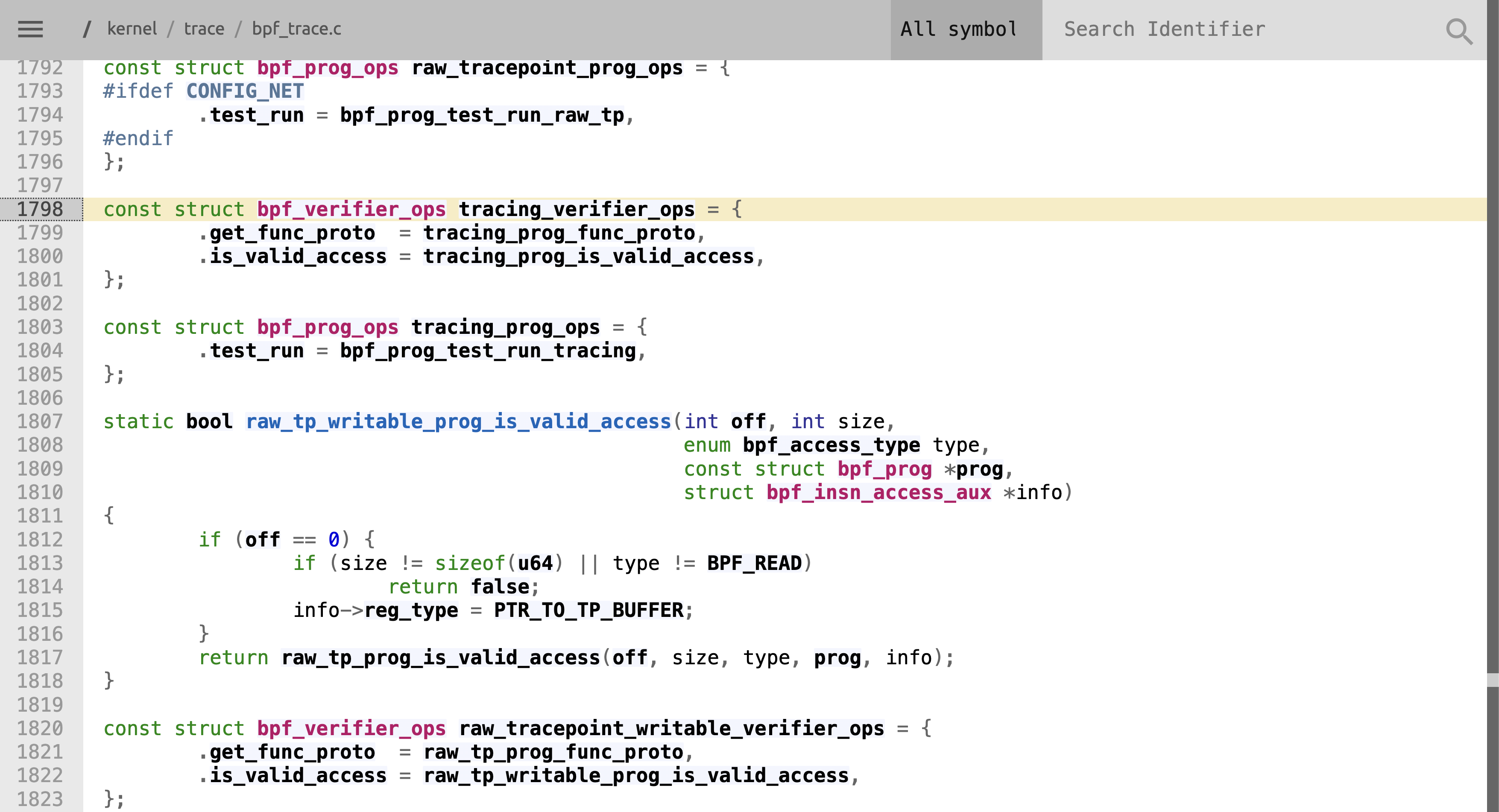
Now, let’s trace assigned value of get_func_proto, tracing_prog_func_proto. We can do this,
by clicking on tracing_prog_func_proto and select the location under Defined in 1 files as function.
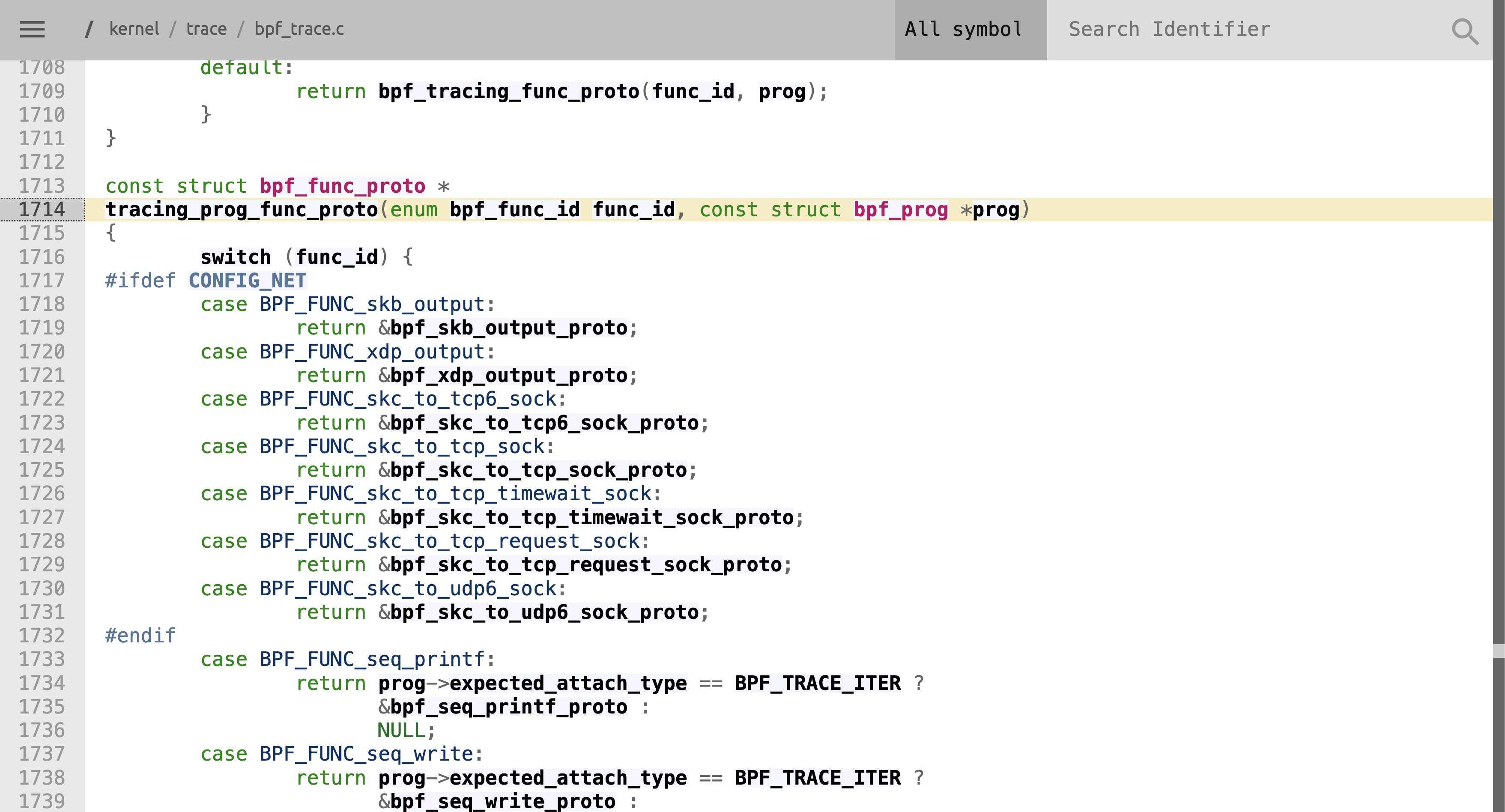
The way tracing_prog_func_proto works is pretty straight forward. In the end it is a series of
some switch statements, that will either match the requested helper bpf_func_id and returns a
function pointer to the helpers definition, or return NULL. bpf_spin_lock is not in the switch
statement of tracing_prog_func_proto, so we go ahead and jump to the function call that is called
in the default branch of the switch. We continue this until we either find that NULL is returned,
or we find the helper id we are searching for. In our case, bpf_spin_lock never shows up and
NULL will be returned, meaning bpf_spin_lock cannot be used in Linux v5.10 for
BPF_PROG_TYPE_TRACING. When you think back at docs.ebpf.io, tracing is listed to be a program
type usable with bpf_spin_lock, where is this coming from? Well, we can try to do the same
exercise for newer kernel version to try figuring out. The next LTS version is v5.15. When doing
the tracing in that version, we end up with a return value for bpf_spin_lock in
BPF_PROG_TYPE_TRACING, meaning it is supported. The easiest would now be to do some sort of binary
search until we can pinpoint the version the function is introduced, but this is an exercise that
is left to the reader.
Conclusion
As you can see, it is not always easy to figure out if you can use a certain eBPF helper in one
of your programs. While some short cuts in the form of bpftool and
docs.ebpf.io exist, they not always give an definite answer. In the end it
is always good to simply open the Linux Kernel source code and verify yourself if the helper you
need is present or not.
In case anyone knows a better more efficient way of finding helper availability for program types, please let me know. Feel free to reach out to me on any of the linked social media platform (or feel free to open an issue/PR on the GitHub repo where this blog lives).